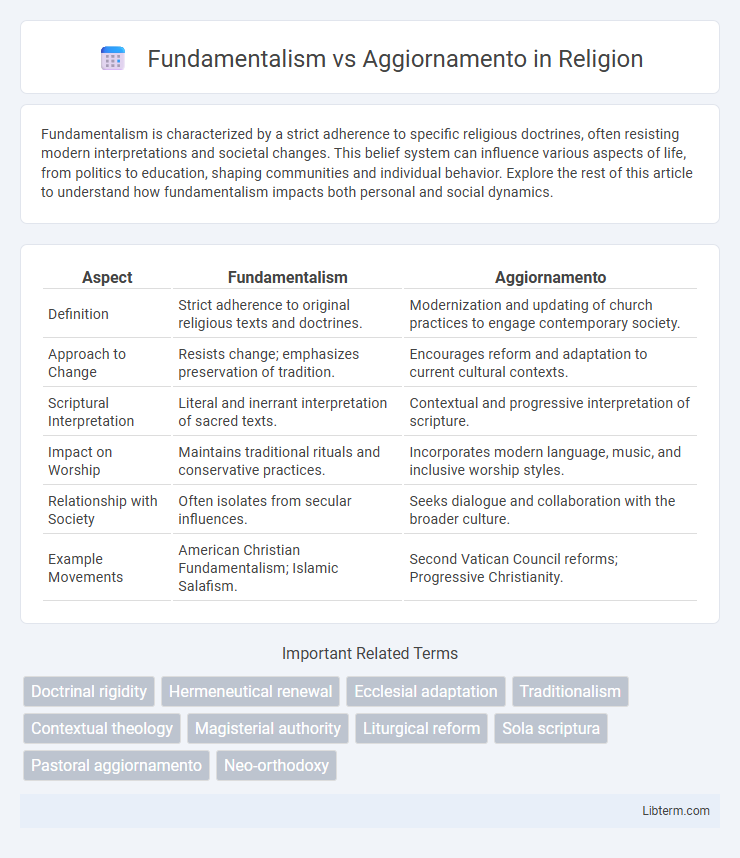Fundamentalism is characterized by a strict adherence to specific religious doctrines, often resisting modern interpretations and societal changes. This belief system can influence various aspects of life, from politics to education, shaping communities and individual behavior. Explore the rest of this article to understand how fundamentalism impacts both personal and social dynamics.
Table of Comparison
| Aspect | Fundamentalism | Aggiornamento |
|---|---|---|
| Definition | Strict adherence to original religious texts and doctrines. | Modernization and updating of church practices to engage contemporary society. |
| Approach to Change | Resists change; emphasizes preservation of tradition. | Encourages reform and adaptation to current cultural contexts. |
| Scriptural Interpretation | Literal and inerrant interpretation of sacred texts. | Contextual and progressive interpretation of scripture. |
| Impact on Worship | Maintains traditional rituals and conservative practices. | Incorporates modern language, music, and inclusive worship styles. |
| Relationship with Society | Often isolates from secular influences. | Seeks dialogue and collaboration with the broader culture. |
| Example Movements | American Christian Fundamentalism; Islamic Salafism. | Second Vatican Council reforms; Progressive Christianity. |
Understanding Fundamentalism: Core Principles
Fundamentalism centers on strict adherence to original doctrines, emphasizing literal interpretation of sacred texts and resistance to modern reinterpretations or cultural shifts. Its core principles include preserving traditional beliefs, maintaining religious purity, and opposing theological innovation. This approach contrasts sharply with Aggiornamento, which advocates for updating religious practices to engage contemporary issues and contexts.
Defining Aggiornamento: Embracing Renewal
Aggiornamento refers to the process of embracing renewal within religious or institutional contexts, emphasizing adaptation to contemporary challenges while preserving core doctrines. This concept gained prominence during the Second Vatican Council, promoting openness, engagement with modern culture, and updating pastoral practices to reflect current realities. By fostering dialogue and reform, Aggiornamento contrasts with Fundamentalism's strict adherence to traditional interpretations and resistance to change.
Historical Roots of Religious Fundamentalism
Religious fundamentalism emerged in the late 19th and early 20th centuries as a reaction to modernist interpretations of scripture, emphasizing a literal reading of sacred texts and resistance to secular influences. This movement crystallized in specific historical contexts, such as the rise of higher biblical criticism and the cultural shifts induced by industrialization and scientific advancements. Contrastingly, aggiornamento, notably within the Second Vatican Council, sought to modernize religious practices by engaging with contemporary culture and promoting dialogue between tradition and modernity.
The Origins and Impact of Aggiornamento
Aggiornamento originated during the Second Vatican Council (1962-1965) under Pope John XXIII as a call to "bring the Church up to date," promoting renewal and engagement with the modern world. This movement aimed to reform liturgy, theology, and Church relations, contrasting with Fundamentalism's strict adherence to traditional doctrines and resistance to change. Aggiornamento significantly influenced contemporary Catholicism by fostering ecumenism, emphasizing pastoral care, and encouraging dialogue with contemporary culture, reshaping the Church's global mission.
Contrasting Ideologies: Preservation vs. Progress
Fundamentalism emphasizes strict adherence to traditional religious doctrines and practices as a means to preserve established beliefs and moral values. Aggiornamento advocates for updating and reforming these doctrines to engage with contemporary society and promote progressive change. The ideological contrast centers on preservation of historical orthodoxy versus embracing adaptation and modernization within a religious framework.
Social and Cultural Implications
Fundamentalism emphasizes strict adherence to traditional beliefs and practices, often resisting social and cultural change, which can lead to increased social polarization and cultural rigidity. Aggiornamento promotes modernization and adaptation within religious institutions, facilitating cultural integration and progressive social reforms. The tension between these approaches influences debates on identity, morality, and the role of religion in contemporary society.
Fundamentalism in the Modern World
Fundamentalism in the modern world emphasizes strict adherence to traditional religious doctrines, often rejecting contemporary cultural and scientific developments. This movement seeks to preserve established beliefs as absolute truths in response to perceived moral and social decline. Fundamentalism contrasts sharply with Aggiornamento, which promotes updating and engaging with modernity to reinterpret religious teachings.
Aggiornamento and Contemporary Adaptation
Aggiornamento represents a proactive movement within the Catholic Church aimed at renewing its teachings and practices to align with contemporary society and modern challenges. Emphasizing pastoral care, social justice, and dialogue with the modern world, Aggiornamento fosters a dynamic faith experience through aggiornamento-driven reforms initiated during the Second Vatican Council. This approach contrasts with Fundamentalism, which upholds strict adherence to traditional doctrines without adaptation, positioning Aggiornamento as a crucial force for ecclesiastical relevance and progressive engagement in the 21st century.
Points of Conflict and Dialogue
Fundamentalism emphasizes strict adherence to traditional doctrines and resists modern reinterpretations, while Aggiornamento advocates for reform and openness to contemporary societal changes within religious frameworks. Points of conflict often arise over issues like scriptural authority, liturgical practices, and the role of the Church in modern society, leading to debates on maintaining purity versus embracing progress. Dialogue between these positions seeks common ground by recognizing the need for faith to address both timeless spiritual truths and evolving cultural contexts.
Toward Reconciliation: Bridging the Divide
Fundamentalism emphasizes strict adherence to traditional religious doctrines, often resisting modern interpretations, while Aggiornamento advocates for updating beliefs to engage with contemporary society. Toward Reconciliation focuses on finding common ground by respecting core values of faith while embracing necessary reforms to address current social and ethical issues. Bridging this divide involves dialogue that promotes mutual understanding and collaborative efforts to unify diverse viewpoints within religious communities.
Fundamentalism Infographic

 libterm.com
libterm.com